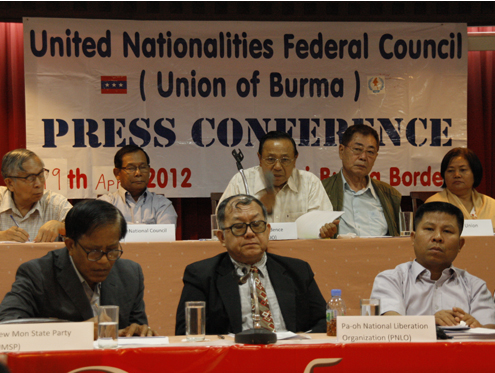As an historic gathering of Burma’s major ethnic armed organisations entered its fourth day on Tuesday, reports emerged that the Kokang rebel Myanmar Nationalities Democratic Alliance Army (MNDAA), along with the Ta’ang National Liberation Army (TNLA) and Arakan Army (AA) were ready to renounce membership of the Nationwide Ceasefire Coordination Bloc (NCCT), a negotiation team set up by ethnic bloc the United Nationalities Federation Council (UNFC).
DVB spoke to UNFC and NCCT delegate Hkun Okker, who is in the United Wa State Army capital of Panghsang for the talks.
Q: Has the MNDAA, the AA or the TNLA left the NCCT?
A: No. Yesterday they made one statement that they are reconsidering their membership within the NCCT. The problem is that the Panghsang summit does not have jurisdiction over this matter, because the NCCT was initially formed at the Laiza EAO [ethnic armed organisation summit]. Ethnic armed organisations will be convening again within the next two weeks, and this case will be considered at that official summit of the NCCT, because of the jurisdiction question.
[pullquote]”All of the organisations need to be within the agreement. That is our basic principle, and we can not abandon that basic principle.”[/pullquote]
So, at this Panghsang summit, they have mentioned their attitude, or their position, but it is not an official withdrawal or decision. They are ready to reconsider their membership and that is their right, but this meeting has no jurisdiction on that.
Q: What positions have the three organisations made clear at this current summit?
A: The groups are not recognised by the government of Myanmar but if they want to [engage in the peace process], then they need permission from Naypyidaw – but the government and the Tatmadaw [Burmese military] are trying to isolate them and blame them for the recent violent conflicts. So there is discontent within their movements. They are trying to think in different ways about their membership of the NCCT. So we have to make more detailed conclusions at our next NCCT summit meeting, not at the Panghsang meeting.
Q: What is the position of the other 13 members regarding the possibility of these 3 armed organisations leaving the NCCT?
A: Within the nationwide ceasefire agreement (NCA) draft we have one central position, which states that all the ethnic armed organisations must be among the signatories to the NCA. We will not leave them behind when signing the NCA. In the case that they are not recognised ahead of the NCA, then the other big groups will not sign it – that is our position.
We need to compromise with the government’s side on this case. At the next EAO summit, groups will make a proposal to the government’s side that we need to find the ways and means to let then join in with the NCA agreement. So we need to find a way, and we need to compromise on that condition with the government’s side.
Q: Would ethnic armed groups attempt to prevent the Kokang, Ta’ang and Arakan groups from leaving the NCCT?
[related]
A: I don’t think so, because they are not in the first place legal groups, just like the Wa – the United Wa State Army – and the Mong-La group, and the Shan State Army- South.
These big groups have, from the outset, not been NCCT members. So an NCCT member or not, that is not the matter – we have to try together collectively to sign the NCA, that is our negotiation agreement within the NCA.
All of the organisations need to be within the agreement. That is our basic principle, and we cannot abandon that basic principle. Even if they leave the NCCT, they will be at an NCA signing ceremony. That is our position.



